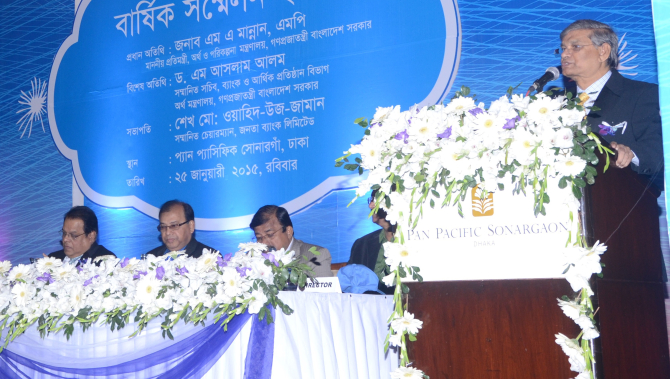Banking
WB pours $400m more fund
The World Bank is pumping $400 million of additional funds into the ongoing Third Primary Education Development Program (PEDP3) to help ensure quality learning and completion of rudimentary schooling for 19.5 million children.
A loan agreement between the government of Bangladesh and the Washington-based lender was signed at Economic Relations Division (ERD) on Sunday with regard to the additional financing.
WBs Country Director Johannes Zutt and ERD Senior Secretary Mohammad Mejbahuddin inked the deal on behalf of their respective sides.
Under the additional financing, the WB will scale up support for improving primary education from grade 1 to 5. PEDP3 will also continue the rollout of one year of pre-primary education with trained teachers and quality materials, with a focus on public primary schools in disadvantaged areas.
Additionally, the programme will expand efforts to bring out-of-school children into the school system.
Today, nearly every child in Bangladesh attends primary school, thanks to successive government programs to bring all boys and girls into the classroom, remarked Zutt.
To build on these achievements, the World Bank and other development partners are stepping up their longstanding support to further strengthen quality, access, and equity, and to establish an effective assessment system in primary education sector. An educated work force will be critical for Bangladeshs aspirations to achieve middle-income status, he added.
The credit from the International Development Association (IDA), the WBs loan arm, has a 38-year maturity with a 6-year grace period and a service charge of 0.75 percent.
PEDP3 is considered a landmark programme globally, which along with its predecessor programmes have helped Bangladesh increase the primary education enrolment rate to over 97 percent and completion rate to about 79 percent.
The number of primary schools receiving textbooks within the first month of the school year has increased from 32 percent in 2010 to over 90 percent in 2014.
The programme has been supporting merit-based recruitment of teachers and the filling of vacancies to reduce the teacher-student ratio. PEDP3 also supports the development and expansion of an 18-month Diploma for primary school teachers.
Facilitated by the programme, the Primary Education Completion Exam has been reformed to address testing competencies instead of rote learning. The additional financing will continue to enhance the quality of school facilities and infrastructure, including use of Information Communications Technology.
The additional financing would ensure access and equity by bringing the poorest children into pre-primary education, enhancing their learning experience and boosting their earning potential as adults, said ERD Senior Secretary.
PEDP3 is a government-led programme, supported by nine development partners. It has introduced the use of country systems for financial management and audit, and harmonised external financing to primary education in Bangladesh under a single programme.
The World Bank is the largest external financier in the education sector in Bangladesh. Its current commitment in the education sector is over $ 1.5 billion, which spans primary, secondary, tertiary, vocational education and also includes programs for out-of school-children.
Janata Bank improves bad debt recovery
 MA Mannan, state minister for finance; Shaikh Md Wahid-uz-Zaman, chairman of Janata Bank, and Md Abdus Salam, managing director, attend the annual meeting of the bank at Sonargaon Hotel in Dhaka yesterday.
MA Mannan, state minister for finance; Shaikh Md Wahid-uz-Zaman, chairman of Janata Bank, and Md Abdus Salam, managing director, attend the annual meeting of the bank at Sonargaon Hotel in Dhaka yesterday.
Janata Bank's default loans decreased 0.77 percentage points due to better recovery. The bank's defaults were Tk 3,306 crore or 10.34 percent of its total loans in December 2014, compared to 11.11 percent in the same month of the previous year, according to statistics disclosed at the bank's Annual Conference yesterday.
Md Abdus Salam, managing director of the bank, said defaults were much lower than state banks' average rate of 20 percent.
Janata's performance was mixed in 2014 but it does not have any provision shortfall at present and its capital adequacy ratio stands at 10.30 percent, against a minimum requirement of 10 percent, Salam said.
In 2014, Janata realised Tk 885 crore against its classified loans, which is almost 85 percent of its annual target.
The bank made an operating profit of Tk 1,053 crore in 2014, which was 13 percent lower than in the previous year.
However, the managing director said among the state owned banks, Janata succeeded in bagging the highest profit.
The bank realised Tk 261 crore in cash from the written-off loans, and the number of its loss-making branches is now 60 out of a total of 904 branches, said Salam. It aims to turn 50 percent of those into profit-making units this year. Due to the finance ministry's reservation, Janata Bank could distribute only Tk 13.84 crore against a target of disbursing Tk 35 crore under its corporate social responsibility.
Shaikh Md Wahid-Uz-Zaman, chairman of Janata, said alongside widening the bank's scope in online services, it will ensure modern banking services to its customers in remote areas through green banking, internet banking and mobile banking.
MA Mannan, state minister for finance, urged bank officials to provide high-quality services to customers using information technology. The government will not intervene in the day-to-day operations of the banks, he added.
The state minister said the present government is a reformist one; however, mistakes happen when reforms are made hastily.
News:The Daily Star/26-Jan-2015
NBL donates blanket to Bangladesh bank for distribution among the cold-hit people
Shamsul Huda Khan, Managing Director & CEO of National Bank Limited handed over the blankets to S K Sur Chowdhury, Deputy Governor of Bangladesh Bank for distribution among the cold-hit people of the country recently. A F M Asaduzzaman, General Manager of Bangladesh Bank, Md. Jahangir Bin Hamid, Senior Vice President, Mir Mosharref Hossain, Vice President of National Bank Limited and other executives & officers of the bank were present at that time.
News:Bangladesh Today/23-Jan-2015Bank Asia opens new branch in Rangpur town
 DHAKA: The 99th Branch of Bank Asia started operation in the Rangpur town from Sunday (18 Jan, 2015) , reports in a press release. Rangpur City Mayor Sharfuddin Ahmed Jhantu formally inaugurated the new branch at Station Road in the town. Mosaddek Hossain Bablu, Former president of Rangpur Chamber of Commerce and Industries, Md. Mojaffor Hossain, Executive Vice President & Head of Bogra Branch, Bank Asia were, among other, present. Members of the business community, local elite and a large number of people also attended the auspicious event. The new branch has all the modern banking facilities including on-line banking and ATM.
DHAKA: The 99th Branch of Bank Asia started operation in the Rangpur town from Sunday (18 Jan, 2015) , reports in a press release. Rangpur City Mayor Sharfuddin Ahmed Jhantu formally inaugurated the new branch at Station Road in the town. Mosaddek Hossain Bablu, Former president of Rangpur Chamber of Commerce and Industries, Md. Mojaffor Hossain, Executive Vice President & Head of Bogra Branch, Bank Asia were, among other, present. Members of the business community, local elite and a large number of people also attended the auspicious event. The new branch has all the modern banking facilities including on-line banking and ATM.
Starting its operation in 1999, Bank Asia is one of the most innovative banks in the country’s banking sector. It offers a wide range of financial services that covers the entire spectrum of banking operations including Islamic Banking,
SME financing, e-banking, ATM, etc under its online platform to deliver the highest standard of services to its clientele, ably supported by the use of state-of-the-art technology.
Swiss central bank says franc move was 'best option'
Switzerland would have had to spend more than $100 billion this month alone if it had continued efforts to hold down the value of its currency, a senior central bank official said Thursday.
In a shock move a week ago, the Swiss National Bank scrapped a three-year-effort to keep down the value of the franc, sending the Swiss currency soaring by as much as 30 percent.The soaring franc wreaked havoc on global markets and bankrupted several foreign exchange traders.
But the central bank has ardently defended the move, insisting its efforts to enforce the ceiling, including purchasing massive amounts of foreign currency, were no longer sustainable.
"In the days running up to the decision to abolish the ceiling the sum ploughed in was increasing," Fritz Zurbruegg, a member of the Swiss National Bank's governing board, told the Blick daily.
If the bank had continued its efforts, "we would have spent about 100 billion francs (100 billion euros, $116 billion) for January alone," said Zurbruegg, the number three in the bank. "We came to the conclusion that the best option was to free up the exchange rate," he added. The decision was taken by the bank's top triumvirate: chief Thomas Jordan, vice-president Jean-Pierre Danthine and Zurbruegg.
The SNB had been defending the exchange rate since September 2011 in an effort to protect the country's vital export and tourism industries. The franc has stabilised around parity with the euro, a strengthening of some 17 percent from the previous limit of 1.20 francs to the euro.
The rate was introduced as the eurozone crisis sent investors scurrying to the safe haven currency. More recently, the Russian ruble crisis put renewed pressure on the franc.
The bank's decision to allow the franc to float has generated widespread criticism, but Zurbruegg insisted that the bank's "credibility" was intact. "We have had no sign of a deflationary spiral," he said.
Swiss businesses, which have seen their shares take a bashing since the decision, are not convinced.
The banking lobby has for instance warned that the strong franc could pose a problem for private banks which earn up to 80 percent of their revenue in foreign currencies with higher cost-income ratios.
Switzerland's iconic watch industry, which exports nearly 95 percent of its top-end products to markets where revenues are earned in dollars and euros, has also said the move will take a harsh toll on sales and margins.
News:The Daily Star/23-Jan-2015


